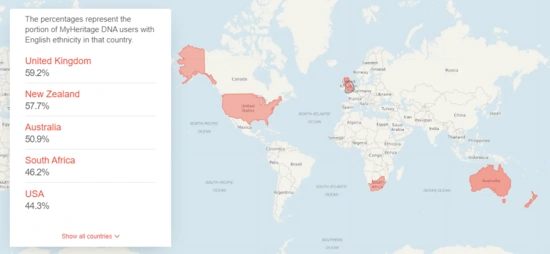
English ethnicity indicates genetic origins in Britain - particularly the eastern part of the British Isles - which has been continuously inhabited for at least 15,000 years, with ethnic roots predating the eleventh century including pre-Celts, Celts, Romans, Anglo-Saxons, Norse, and Normans. Since the medieval period, other ethnicities have migrated to Britain, whether by invitation (European Jews in 1070), as a consequence of the African slave trade (dating back to the 1730s), or through trade (including the oldest Chinese community in Europe, dating back to the nineteenth century). After WWII, immigration increased exponentially, as the British melting pot came to include immigrants from the Caribbean, South Asia, and Africa. Today, the dominant ethnic group in Britain is still the English, together with their Celtic neighbors — the Irish, Scottish, and Welsh.
Research your ancestors on MyHeritage
English historyEnglish history

Between 1500 and 500 B.C.E., Celtic tribes migrated from Central Europe and France to Britain and mixed with the island’s indigenous inhabitants. The Romans conquered Britain in 43 B.C.E., but when the empire receded in the fifth century C.E., the Romans abandoned the island. With the Romans gone, the Celtic tribes resumed their fighting, and 3 continental Germanic tribes — the Angles, Saxons, and Jutes — capitalized on the scuffle and conquered the island. Viking incursions and conquests starting in the ninth century added the final piece to the Germanic puzzle in Britain. In 1066, the French-speaking Normans conquered England: William the Conqueror became William I of England, and his descendants have sat on the throne of England to this day.
Successive kings to William I fought civil wars over succession, launched crusades against infidels, and embarked on missions to subdue and conquer their Scottish and Welsh neighbors. One of those kings, Henry VIII (d. 1547), became the first English King of Wales and Ireland, respectively; he also severed England’s ties with the Vatican, proclaiming himself head of the new Church of England. England’s identity as either Catholic or Protestant remained contested until the reign of Queen Mary II (d. 1694), when Parliament decreed all subsequent rulers must be Protestant.
During this period, the first British colonies in the New World and the British East India Company were established, ushering in the age of British colonialism, which peaked during the Nineteenth and twentieth centuries. At the height of her 64-year reign, Queen Victoria (d. 1901) ruled over 40% of the globe and over a quarter of the world’s population. The triangular trade that circulated slaves, cash crops, and manufactured goods between West Africa, the Caribbean, and British-American colonies, and the concurrent deindustrialization and subjugation of India by the British Empire, is a dark chapter in British history, but nonetheless one that made the world as it is today.

Queen Victoria’s numerous children married into just about every royal family in Europe. Those alliances, rivalries, and intrigues escalated and led to the Great War (WWI) of 1914–1918. The consequences of the horrific war in Britain were disillusionment with the government and monarchy, leading to radical political and social changes, including universal suffrage in 1928. Following the Nazi invasion of Poland in 1939, Britain and France declared war on Germany, triggering the Second World War. Under the leadership of Winston Churchill, Britain successfully fought off the Nazi offensive, and, together with Russia and the U.S., secured victory for the Allied Forces.
Following the war, an impoverished British Empire was dismantled bit by bit, first granting independence to India and Pakistan in 1947, then other Asian, African, and Caribbean colonies throughout the century. Most of these ex-colonies formed the British Commonwealth, accounting today for about 30% of the global population and about 25% of the world’s land area.
English cultureEnglish culture

In terms of cuisine, despite an international reputation of being bland and unsophisticated, the English are proud of their vast range of national dishes. These include some international favorites such as fish and chips and shepherd’s pie, and local favorites, such as Yorkshire pudding (a baked pudding made of eggs, flour, and milk, often softened with gravy), Cumberland sausage (a long, coiled pork sausage), and Lancashire hotpot (a baked stew of lamb or mutton with onions and sliced potatoes). The quintessential English food, however, is pie — eaten with an assortment of fillings, including beef, game, pork, and fish.
Neo-Goth, an architectural movement popular in the Western world around the 18th and 19th centuries, began in the late 1740s in England. Hallmark examples include the Palace of Westminster, Tower Bridge, and Big Ben clock tower in London; Chhatrapati Shivaji Terminus in Mumbai, India; and the Bedford Presbyterian Church in New York.

English contribution to poetry, literature, art, and music is far too wide in scope to be reduced to a single paragraph. Playwrights such as Christopher Marlowe and William Shakespeare; poets such as Lord Byron, Percy Bysshe Shelley, and John Keats; and novelists such as Jane Austen and Charles Dickens are true giants of the Western canon. While the 20th century saw the ascent of American cultural dominance, English artists continued to influence their fields: bands like the Beatles, Pink Floyd, the Rolling Stones, and Black Sabbath fundamentally redefined pop and rock music.
Finally, it would be impossible to talk about the English contribution to world culture without mentioning football (soccer): modern football was formulated and codified in England during the nineteenth century. Today, football is the most popular sport in the world: it is estimated that more than half of the world’s population consider themselves to be football fans. The sport enjoys an estimated following of 4 billion people globally. England have won the World Cup once, in 1966, and have since been waiting eagerly for football to “come home.”
English languagesEnglish languages
The English language belongs to the West Germanic branch of the Indo-European family of languages. The invasion of Germanic tribes in the fifth century led to the development of Old English. Upon the Norman conquest of England in the eleventh century, Latin elements were introduced into the language, resulting in Middle English. Later events, such as the English Renaissance, the Industrial Revolution, colonialism, and globalization recast the language into Early Modern, Late Modern, and Modern English, respectively. English has found its way outside of the archipelago: spread first by the conquests of the British Empire and then later cemented by U.S. cultural dominance in the age of globalism, English has become the most important and influential language in today’s world.
See alsoSee also
Explore more about ethnicity estimatesExplore more about ethnicity estimates
- MyHeritage DNA at MyHeritage
- Ethnicities around the world at MyHeritage
- What Is My Ethnicity? How MyHeritage Estimates Ethnicities at MyHeritage Knowledge Base
- Where's My Ethnicity?!: Why An Ethnicity Might Not Show Up In Your DNA (and How To Find Evidence Of It Anyway) at MyHeritage Knowledge Base

